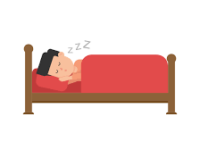Most people look forward to finally lying down to sleep at the end of a long day. This can be especially true for college students, as 70.6 percent attain fewer than the medically advised 8 hours per night, according to a study by the National Sleep Foundation. Despite many years of research, the exact function of sleep is still unknown. There are several working hypotheses about the purpose of sleep. It could be for energy conservation, brain thermoregulation, brain detoxification, tissue restoration, or a combination of these. Additionally, there is a mounting body of evidence that suggests sleep is beneficial for brain plasticity, or the ability of neural networks in the brain to change through growth and reorganization, impacting learning and memory. Therefore, getting enough sleep may be just as helpful in a college student’s learning process as the studying itself.
Therefore, getting enough sleep may be just as helpful in a college student’s learning process as the studying itself.
The idea that sleeping and dreams can have an effect on learning is not new; Freud observed over 100 years ago that events from the previous day can appear in dreams. However, rigorous scientific research has only recently begun to test the extent of this relationship, and the exact details are still not yet understood. One proposal, the dual process theory, states that different types of memory are dependent on sleep state. The two main sleep states are rapid eye movement (REM) sleep and slow wave sleep (SWS). Procedural memory, or knowing how is linked with REM sleep. Examples of procedural memory are remembering how to ride a bike or cook an egg. Conversely, declarative memory, or knowing what is dependent on non-REM sleep. Declarative memory can be further divided into semantic and episodic memory. Semantic memory is knowing facts, like the state capitals, and episodic memory involves the recollection of personal experiences or events in an individual’s life.
While the dual process theory maintains that sleep state has an effect on how different memory types are stored, the sequential processing theory hypothesizes that all long-term memory formation is prompted by SWS and then consolidated by REM sleep. Consolidation is the conversion of recent learned experiences into long-term memory. Because long-term memory is formed during SWS and stored during REM sleep, the sequential processing theory requires sufficient time in each sleep stage, as well as progression with little interference.
Several neurological studies have concluded that sleep is important for the formation of long-term memory.
It is theorized that the consolidation process occurs via active communication between the cortex, the thin external layer of the cerebrum in the brain, and hippocampus, a structure in the temporal lobe. The hippocampus converts new short-term memory into long-term memory stored in the cortex. This is supported by the correlation between electroencephalogram (EEG) events of the cortex and hippocampus, suggesting the two areas actively interact during sleep. Additionally, cell pairs that are correlated while a person is awake show similar activity during sleep both within and between the hippocampus and cortex.
Several neurological studies have concluded that sleep is important for the formation of long-term memory. A 2006 study by MIT researchers looked at the reactivation of memory networks during sleep. In the study, rats first slept for 1 to 2 hours, then were awakened to run a maze, and finally entered another sleep period. During SWS, the neuron firing patterns of the rats in the hippocampus and visual cortex coordinated with the awake phase. As mentioned previously, the hippocampus and cortex are vital to the process of memory consolidation, so this experiment provides support for the hypothesis that sleep aids in consolidation and long-term memory formation.
Studies in both humans and model organisms have demonstrated that neural networks correlated with the conversion of short to long-term memory are reactivated during sleep, and sleep could even result in recollection improvements.
This has also been suggested in humans; a 2004 study from the Belgian Fonds National de la Recherche Scientifique looked at cerebral blood flow measurements as a measure of brain activity and had subjects memorize routes in a virtual town, a declarative spatial memory task. It was found that the same hippocampal areas active during learning were reactivated during SWS. Furthermore, they found an improvement in memory performance the following day.
Studies in both humans and model organisms have demonstrated that neural networks correlated with the conversion of short to long-term memory are reactivated during sleep, and sleep could even result in recollection improvements. However, a correlative relationship is not definitive enough to determine causation, and it is not yet clear if this activation causes consolidation. More evidence is needed to fully elucidate the effects of sleep on memory. Still, these preliminary findings suggest that it’s worth it to take a break from cramming and go to bed.
Image Source: Pixabay






